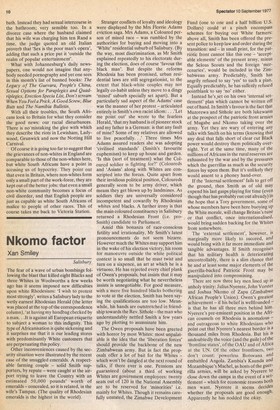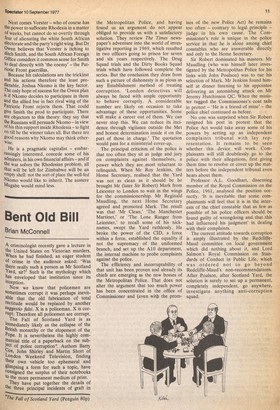Nkomo factor
Xan Smiley
Salisbury The fear of a wave of urban bombings following the blast that killed eight Blacks and three Whites in Woolworths a few weeks ago has it seems imposed new difficulties upon white Rhodesians: 'I wish to protest most strongly', writes a Salisbury lady to the wetly earnest Rhodesian Herald (the letter was placed at the top of the correspondence column), 'at having my handbag checked by a man. . .It is against all European etiquette to subject a woman to this indignity. This type of Africanisation is quite sickening and it surprises me that it is our leading stores with predominantly White customers that are perpetuating this policy.
Other inconveniences caused by the security situation were illustrated by the recent case of the smuggled emeralds. A respectable farming couple — solid Smith supporters, by repute — were caught at the airport trying to leave the Country with an estimated 50,000 pounds' worth of emeralds — concealed, so it is related, in the wife's Tampax. (The quality of Rhodesian emeralds is the highest in the world). Stranger conflicts of loyalty and ideology were displayed by the Mrs Morrie Adams eviction saga. Mrs Adams, a Coloured person of mixed race — was rumbled by the authorities for buying and moving into a 'White' residential suburb of Salisbury. (By the way, most discrimination, as Mr Smith explained repeatedly to his electorate during the election, does of course 'favour the black man'. But despite the reforms Rhodesia has been promised, urban residential laws are still segregationist, to the extent that black-white couples may not legally co-habit unless they move to a dingy 'mixed' suburb specially set apart). But a particularly sad aspect of the Adams' case was the manner of her protest — articulated entirely in Smith's own racist idiom:. . .'Let me point out' she wrote to the fearless Herald, 'that my husband is of pioneer stock and my father is a German: is that any fault of mine? Some of my relatives are allowed to live peacefully. . .' Three times Mrs Adams assured readers she was adopting 'civilised standards' (Smith's favourite euphemism) to keep up house and garden. 'Is this (sort of treatment) what the Coloured soldier is fighting for?' (Coloureds and 'Asians' along with Whites are conscripted into the forces. Quite apart from their invidious political position, Coloureds generally seem to be army driver, which means they get blown up by landmines. As soldiers they are universally considered incompetent and cowardly by Rhodesian whites and blacks. A further irony is that the main coloured constituency in Salisbury returned a Rhodesian Front (i.e. proSmith) candidate to Parliament.
Amid this bonanza of race-conscious futility and irrationality, Mr Smith's latest pronouncements do not seem bizarre. However much the Whites may support him in the wake of his election victory, his room for manoeuvre outside the white political context is so small that he must twist and turn on a sixpence, an art at which he is a virtuoso. He has rejected every chief plank of Owen's proposals, but insists that it may be worth negotiating what he nevertheless insists is unnegotiable. For good measure, with a mere five hundred blacks bothering to vote at the election, Smith has been saying the qualifications are too low. Meanwhile, his hands are outstretched in friendship towards the Rev. Sithole the man who understandably nettled Smith a few years ago by plotting to assassinate him.
The Owen proposals have been greeted with horror by most Whites: most unpalatable is the idea that the 'liberation forces' should provide the backbone of the new Zimbabwean army, But in fact the proposals offer a lot of bait for the Whites — which won't be dangled at the next round of talks, if there ever is one. Pensions are guaranteed (about a third of working Whites are governnaent employees: twenty seats out of 120 in the National Assembly are to be reserved for'minorities' i.e. mainly for Whites. Though it remains carefully unstated, the Zimabwe Development Fund (one to one and a half billion U.S. Dollars) could at a pinch encompass schemes for buying out White farmers: above all, Smith has been offered the present police to keep law and order during the transition: and — in small print, for the patriotic front cannot like this one — 'acceptable elements' of the present army, minus the Selous Scouts and the foreign 'mercenaries', would be included in the Zimbabwean army. Predictably, Smith has angrily refused to say 'yes' to such a plan. Equally predictably, he has sullenly refused pointblank to say `no' either.
Instead he'snset on his own 'internal settlement' plan which cannot be written off out of hand. In Smith's favour is the fact that Muzorewa and Sithole are both lukewarm at the prospect of the patriotic front armies of Mugabe and Nkomo taking over the army. Yet they are wary of entering any talks with Smith on his terms (knowing that any deal that falls short of clear cut Black power would destroy them politically overnight. Yet at the same time, many of the millions of Africans in the rural reserves are exhausted by the war and by the pressures which the guerrillas as much as the security forces lay upon them. But it's unlikely they would assent to a phoney hand-over. If the 'Internal settlement' fails to get off the ground, then Smith as of old may expend his last gasps playing for time (even though that has probably run out already) in the hope that a Tory government, some of whose members have been here buoying up the White morale, will change Britain's tune or that conflict, once internationalised, would bring sudden backing for the Whites from somewhere.
The 'external settlement', however, is marginally more likely to succeed, and would bring with it far more immediate and tangible advantages. If Smith recognises that his military health is deteriorating uncontrollably, there is a slim chance that he and at least some major elements of the guerrilla-backed Patriotic Front may be manipulated into compromising.
There are now three key men lined up in unholy trinity: Julius Nyerere, John Vorster and Joshua Nkomo of Zapu (Zimbabwe African People's Union). Owen's greatest achievement — if his belief is wellfounded — is that he has all three men behind him. Nyerere's pre-eminen't position in the African counsels on Rhodesia is anomalous — and outrageous to white Rhodesians who point out that Nyerere's nearest border is a thousand miles from Rhodesia. But his is undoubtedly the voice (and the guile) of the 'frontline states', of the OAU and of Africa at the UN. Of the other frontliners, two don't count: powerless Botswana and embattled Angola. Zambia's Kaunda and Mozambique's Machel, as hosts of the guerrilla armies, will be asked by Nyerere to close down the camps in the event of a settlement — which for economic reasons both men want. Nyerere it seems decides whether the proposals are good enough. Apparently he has nodded the okay. Next comes Vorster — who of course has the power to suffocate Rhodesia in a matter of weeks, but cannot do so overtly through fear of alienating the white South African electorate and the party's right wing. But Dr Owen believes that Vorster is itching to ditch Smith, and the South African Foreign Office considers it common sense for Smith to deal directly with 'the enemy' — the Patnode Front guerrillas. Because his calculations are the trickiest and his actions therefore the least predictable, Joshua Nkomo is the key factor. The only hope of success for the Owen plan is if Nkomo decides to participate in them and the allied but in fact rival wing of the Patriotic Front rejects them. That could give Smith the prod to participate. There are objectors to this theory: they say that the Russians will persuade Nkomo —in view Of his thin support inside Rhodesia — to tight on till he the winner takes all. But there are good reasons why Nkomo may think other
Wise.
He is a pragmatic capitalist — embarrassingly interested, concede some of his admirers, in his own financial affairs and if the war solves the Rhodesian problem, all that will be left for Zimbabwe will be an empty shell: not the sort of place the well-fed Nkomo would like to inherit. The austere Mugabe would mind less.































 Previous page
Previous page